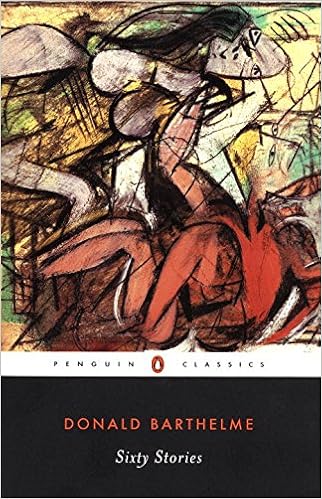Once, a long time ago, I was tasked to write up a bio and summary of criticism on Frederick and Steven Barthelme. I wrote up one on Donald, having been initially given the wrong name. A couple of years after that, I read Donald Barthelme's Snow White. It was absurd and fun and funny. I read it in the Fort Worth Central Library, in one sitting, as I had no means to check out books from that library, living literally a few hundred yards out of town. It's been nearly twenty years. Now I'm finally back to Barthelme. Why? He kept coming up in discussions about experimental fiction. And he showed up as the author of a story taught alongside a story by another author I know. I figured it was time to try Barthelme's short pieces.
Overall, I found the collection fun and intriguing, by as I find with that genius Faulkner's novels, it didn't feel like much of anything added up. These are stories that often just drop off, without any kind of epiphany. Barthelme, I'm sure, was eschewing that element of the form, an element that in its ubiquity almost seems trite. And yet, I find a story without some kind of gravitas ending to be, well, an anecdote. It doesn't tend to stick with me, no matter how clever or absurd the premise and execution.
My favorite stories of this collection generally managed to do something that thing that was clever or absurd, and they were often funny in a smile sort of way. Others were hard to stick to. Among the one that were hardest to stick with, for me, were those that consisted wholly of dialogues. Not only was it difficult sometimes to follow the conversations (often with non sequiturs) but the conversations often didn't seem to go much of anywhere. Now, if I managed to become engaged in the topic of the conversation, and sometimes I did, the dialogue could be quite funny in the smile sort of way. A masterpiece of this form was "The Farewell," which consisted of two people talking about getting into an exclusive institution--only it's not so exclusive as it once was. We see a good deal of awkward and mean competition between two "friends."
My favorite piece in the collection by far was one drawn from what I believe to be one of Barthelme's novels. It was called "A Manual for Sons." It is essentially a summation of fatherhood--what "father" means. I don't know exactly what it is that Barthelme does here that makes the piece so intriguing. It's simply an definition essay on fathers, but the way that he goes about setting out that definition, with its specificity and, many times, ridiculous appeals to history or anecdote fascinates like poetry.
Characteristic of the collection is the very first story, "Margins," which is about two men discussing character and handwriting analysis. If handwriting shows who we are, why bother reforming ourselves--instead, reform our handwriting. The story is an exploration on inner versus outer, surface versus depth--the margins. How can or does one reflect the other? And yet, Barthelme seems to provide no real answer--there's just a lot of talk. And one is left nodding the head, saying, Interesting. Maybe even beautiful. But so what?
Monday, December 7, 2015
On "Sixty Stories" by Donald Barthelme ***
Labels:
Books,
Collections,
Donald Barthelme,
Three-Star Collections
Subscribe to:
Post Comments (Atom)







No comments:
Post a Comment